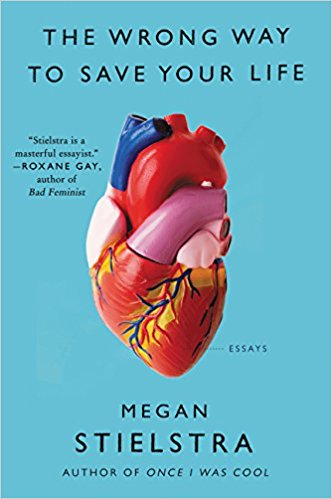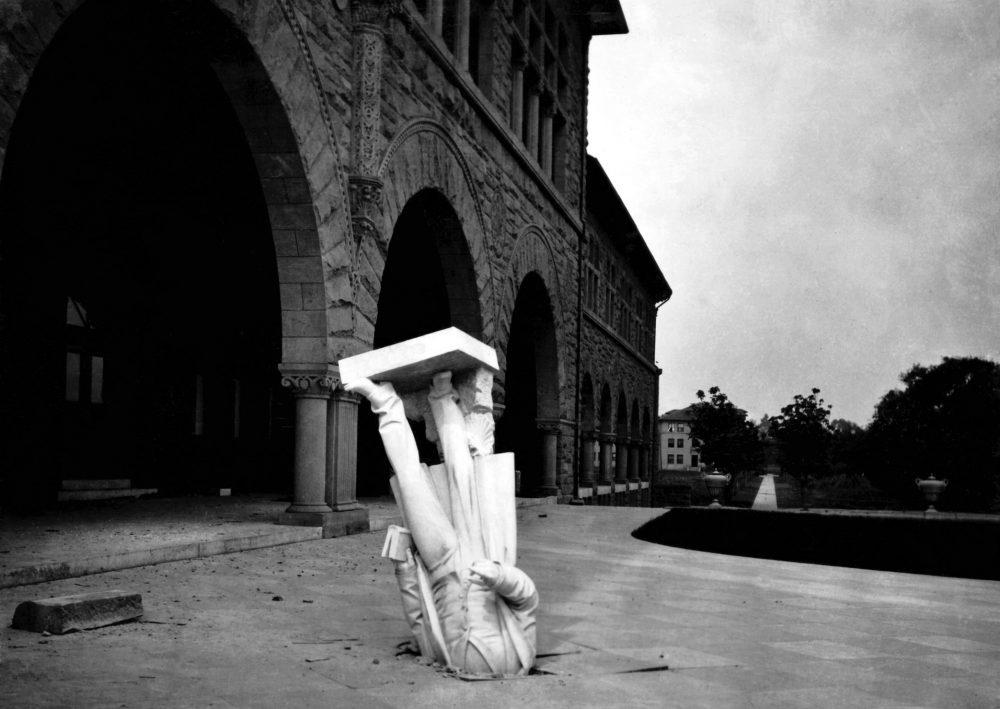interviews
Our Education System Is as Crazy as Anything in Science Fiction
Megan Stielstra on a culture of student debt, silenced minorities, and pouring mimosas to be able to afford to teach

When you read Megan Stielstra’s new essay collection, The Wrong Way to Save Your Life, you know that she’s a powerful essayist. But when I talked to her about the collection, it became clear that her identity as a writer is manifold: her skills as an orator and an educator are just as honed as her prowess in memoir. Reading the collection will make you want to sit in on one of her workshops or watch her perform live storytelling in Chicago.

These stories of the classroom and of being an active participant in a vibrant cultural community weave their way into the essays that make up The Wrong Way to Save Your Life. It’s an eloquent study in the braided essay, as well as an exciting expansion of the form. Stielstra discusses the nature of growing up, how community building and radical pedagogy can build a better educational system, the national discourse on topics like gun control and sexual assault, all while building a conversation with other contemporary nonfiction writers and texts.
Not surprising given the wide range of ideas Stielstra covers in the collection, our conversation meandered all over the terrain of the problems of our society today, how to be a responsible writer and educator, and how waiting tables prepares you for a career in writing.

Becca Schuh: I loved all your writing about teaching. I graduated from a small interdisciplinary studies program, and I noticed a lot of commonalities in terms of radical pedagogy. So obviously that’s a huge topic you’re wrestling with in the book — how would you introduce people to that type of education?
Megan Stielstra: My graduate work was specifically in the teaching of writing. That’s something I think a lot of college teachers don’t necessarily have. You have this great expertise in a subject matter, but where is the support for how to teach and how to give that expertise to people. More importantly, how do you get to know the people who are in the room you’re standing in? What are their needs and wants? How can you serve the needs of the people in the room? I think that how I view education has a lot to do with just sitting and listening to people in that space. I can get really jargon-y, and I can talk about community building as a pedagogical practice, but it really boils down to that.
I was in college in the late nineties and early 2000s, and it was a hell of a lot cheaper than it is right now. I don’t want young people to be saddled with this massive debt for a single classroom. A lot of this is on the administration, too, the upper administration deciding the money that’s being spent and whether that’s going to strap young people in the future.
Each thing I say gets bigger and bigger because it’s not just administrators. We need to look at the federal government on this, because you cannot step out of college and already be underground in a hole. Just even saying that sentence out loud makes me want to set the walls on fire. This cannot be the way that it is. But it is, and it’s as crazy to me as science fiction and the machines taking over and aliens landing tomorrow.
BS: I had similar feelings to that a lot of times while reading the book, as you point out these ideas in education — not education itself but administration and how it’s handled — that just don’t make sense. It elicits this intense emotional response when you start to think about how backwards it is.
MS: While teaching I also worked in faculty involvement, so I had this interesting viewpoint, of talking to hundreds of college teachers every week and seeing what they were doing in their classrooms, the successes and challenges and frustrations they were having. And there would be this moment of realization, when I’d see that these feelings I’d been walking around with — like, dude this doesn’t seem right — they were validated and covered in conversations with hundreds of people.
A really clear example of this for me came this past October, right before the election. I teach at Northwestern, and in my creative nonfiction class, not long after the Access Hollywood tapes came out, I had several young women turn in essays about sexual assault. I think that that was not an isolated incident in this country. After the whole grab them by the pussy thing, you started hearing women talk. All of a sudden you go from one story and one isolated experience to hundreds of thousands and you just see the magnitude of not being alone in this — the power behind our stories when they’re told in volume, en masse. We can see this is real this is a problem this is not something that’s in our heads.
The next real challenge is we have is to listen to those hundreds of stories. We have to listen when students at colleges tell us something is wrong. We have to listen when half of our professorship is not making a living wage. We have to listen when women are talking about sexual assault, we have to listen to people of color, we have to listen to queer people. None of these stories are new. The thing that needs to change is the listening, and then from there the action.
We have to listen when women are talking about sexual assault, we have to listen to people of color, we have to listen to queer people. None of these stories are new.
BS: I was thinking about how the internet has increased the accessibility and availability of this information, and you know it’s so easy to gripe about the bad things about the internet, but thinking about how incredible it is that it’s this venue where people have such easy access to stories. But then, as you’re saying, you have to read them, and think about them.
MS: I think so much about the work being done by editors, and my husband is a curator, he runs an art blog, so he looks at thousands of pieces of art per day, and he finds the stuff that is incredible, and you can say the same thing about the role of an editor. I think the the idea of curation, the skill, what we’re really talking about here is media literacy. To be able to look at all of this stuff and delve into our sources and read multiple different perspectives and to be able to separate the facts from the truth.
BS: I work at a bar right now but I’ve worked at a lot of places, fancy, breakfast, the whole thing, so I was fascinated by a lot of your writing about the service industry and how it relates to creativity. There’s a passage where you say that watching customers get drunk and then tell stories helped you develop your own storytelling techniques. Were there any other things that you observed in restaurants that influenced your process as a writer?
MS: Oh my god, in the restaurant? Everything. Shit, I was at that place for twelve years. Specifically I’m talking about The Bongo Room in Chicago. There is no way I’d be where I am now without that restaurant. Not just my ability to make a living, but also living in a big city, I came from a very small town in Michigan, my father lives in Alaska, and for the longest time this was my family. Three of the women who I waited tables with for a decade were over here for dinner last night. I officiated a wedding for one of them when she married her husband last year. This is my family. I talk in the book about the year that I lived in Prague, and before I left, I went to my boss, and he said “Are you quitting or are you going on sabbatical?” And a year later I called him, we’d just got back I was so broke, so broke, and I called him and I’d just got off the plane, I’m totally jet lagged, I call thinking I’m going to try and get back in a month or so and he goes “Great I’ll put you back on for tomorrow morning.” These are the people who took care of me.
I was waiting tables while being a college professor, so people would ask, “What else do you do besides work here?” and I’m like “Well I’m a professor,” and there’s this…whoa, what. And then you can engage in a dialogue, like “Did you know that half of your college professors aren’t paid a living wage? Did you know what professors were full time and who weren’t?”
BS: You wrote: “I explain that I make more money pouring mimosas than I do teaching college students, let’s sit quietly for a moment and consider what this says about our culture.” What do you think it says?
MS: Part of the reason it was important for me to put that section in is that I don’t think with writing we spend a lot of time being really honest and upfront about the money. It’s not fair, it’s not right to young writers.
We have to talk about the basics of how do you eat, how do you pay rent, how can you be saving for retirement and not eat cat food — that is vital. There are so many voices that are being lost. There’s an organization that supports women, people, writers, who do now or have lived below the poverty line writing about poverty — the Economic Hardship Reporting Project — which is so vital, because so many people who are writing about poverty have never had that lived experience.
A thing that I think is really terrific is what Saeed Jones is doing with the Buzzfeed Emerging Writers Fellowship. You’re getting the professional support that you need, but it’s also paying you so you can live in New York for the duration. It would be incredible if that could be a model. I’m not the first person saying this, this has been said and said and said, but if internships are gateways into these positions, then the only people who are going to be able to work these internships are people who don’t need to be paid. And so again, what voices are we missing? I think that for me this all comes back to that Chimamanda Adichie lecture, “The Danger of a Single Story.” We’re just hearing from one voice what it means to survive in this country or what it means to be a young person, what it means to work. And if we’re not hearing from all sorts of voices then we’re not hearing the truth.
A lot of my students say, I want to be a writer but I’m here for pre-med or pre-law. My parents want me to do this. And the thing you want to say is, it’s your life, do whatever you want to do. But man, there is some privilege behind that comment. The young woman I’m thinking of specifically, her parents immigrated to this country. And they worked their asses off to send her to school, and there were all sorts of expectations. And she ended up writing a story about the conversation that she and I had about that. A really incredible essay.
We have to talk about the basics of how do you eat, how do you pay rent, how can you be saving for retirement and not eat cat food.
BS: I noticed in both your previous essay collection, Once I Was Cool, and this one — you talk about these manual processes that you undertake while writing essays. There was the one with the bathtub in the previous book and then in this book, dissecting the deer hearts. What was the root of the idea behind those processes?
MS: The deer heart exercise began with — I was really scared of losing my dad. That’s a piece that has been written and written and written and written — person is scared of losing family member.
So if I approach the essay with the question of ‘how do I stop my dad from climbing mountains,’ that’s not an interesting essay, because that’s been told a hundred million times, and the answer is clear: dad loves the mountains, dad will climb the mountains. So for me the question became, what do I do with all of my fear? While I was thinking about that, my dad sent us a big old box of deer hearts, and I was sitting looking at them, and I thought, ‘I don’t even know how one of these things works.’ I have twenty years in higher education where we’ve done all this shit with the heart as a metaphor, and I was sitting here with a visceral, an actual heart in my hand. The only other time I’d dissected anything was in high school with the frogs. So I was sitting there trying to cut up these deer hearts, and I couldn’t remember anything about that besides a closeup of a frog. I tried to unpack why, and then I realized oh, fuck, it’s because my teacher was Stephen Leith. [Stephen Leith was the perpetrator in a school shooting where Stielstra’s father was working in administration.] The essay made a lot more sense then. You can’t really talk about my dad and his move to Alaska without talking about this shooting. It originally wasn’t something I ever wanted to write about; for a long time, that was because I didn’t think it was my story to tell. And then…it is. This changed the trajectory of our lives. It’s an important conversation to talk about, how tragedies in our culture spill out in the big and huge ways that touch every person’s life.
BS: What else is on your mind as the book enters the world?
MS: I think there’s a single story being told in this country right now about Chicago. I want to be able to contribute to what the city really is, and to give one of many other perspectives on it, and to be able to say, “this place made me, I am here because of its arts organizations and because of its schools and because of its writers and its performers and its young people, and I’m so proud to be counted among them.” I really want to do justice to this place in some kind of a way, if this book can be a little bit of a love letter to Chicago, that means something to me, especially now.
The way you know Chicago through literature is reading about 700 different people from all sorts of corners. I’m reading I Am Not Your Perfect Mexican Daughter, by Erika Sánchez. And two other Chicago writers I love have books coming out this month, Jac Jemc and Lindsay Hunter. You hear so often the idea that Chicago is a flyover city. What people are missing by not stepping into our pages and our streets is something huge and kind of magic.










